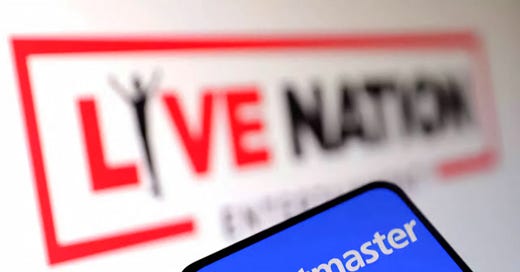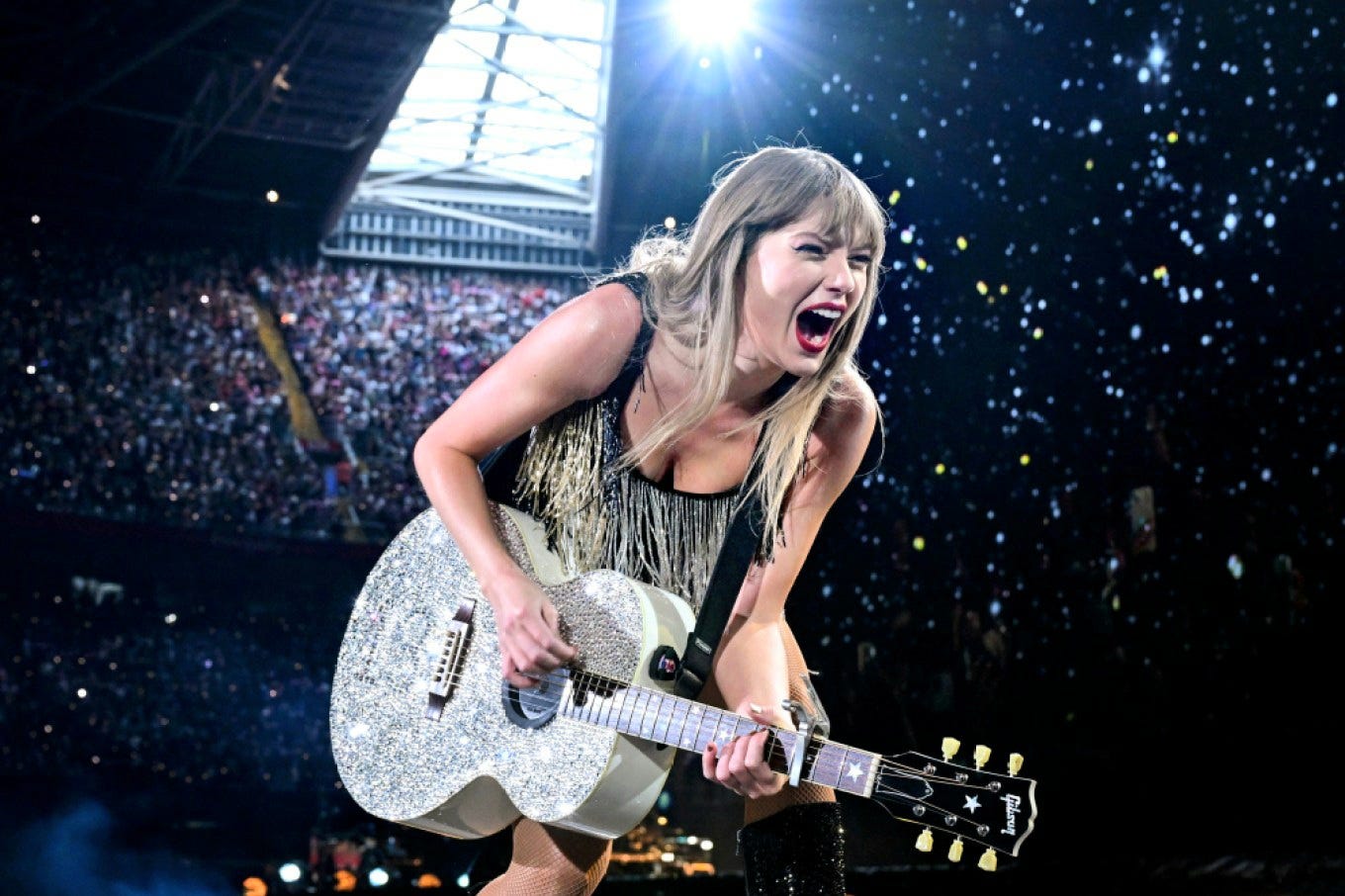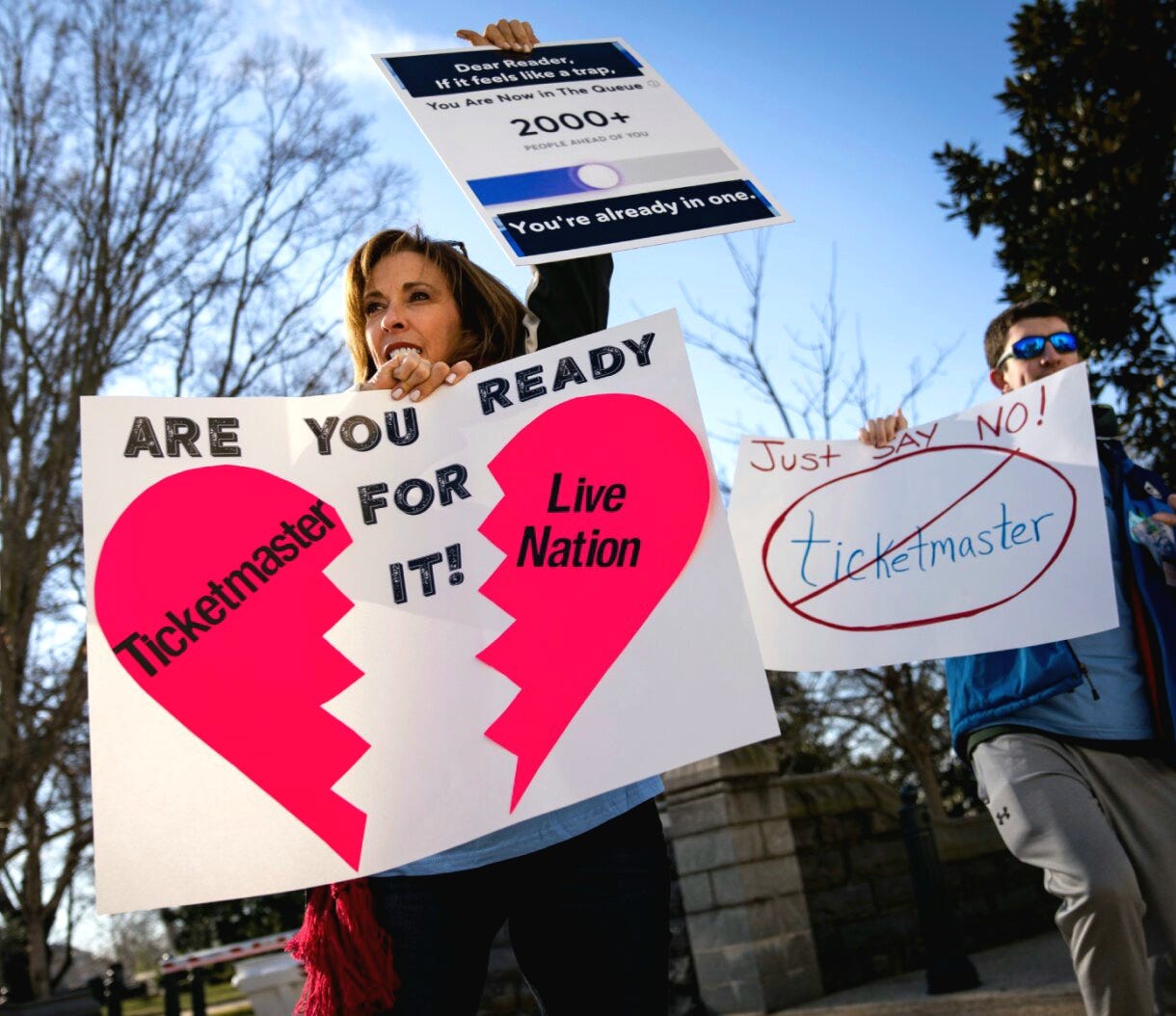The Ticketmaster Monopoly | How Corporate Giants Turned Live Music into a Predatory Market 🎙️💰
Inside the entertainment behemoth's stranglehold on concerts, artists, and your wallet
Live music should be a magical experience; artists connecting with fans in real-time, creating memories that last a lifetime. Yet for millions of concert goers, the joy of live performances has been over-shadowed by a frustrating reality; skyrocketing prices, hidden fees, and a ticketing system that is designed to exploit rather than serve.
At the center of this broken market stands a corporate behemoth whose influence touches nearly every aspect of the concert experience.The Swift Meltdown | A Symptom of a Deeper Problem
November 2022 became a watershed moment when Ticketmaster's systems crashed during the Taylor Swift Eras Tour pre-sale. As 3.5 million registered fans attempted to purchase tickets, the platform buckled under 3.5 billion total requests, (yes, billion) four times their previous peak. The system failed spectacularly, leaving countless fans stranded in frozen digital queues or logged out entirely. Taylor Swift herself expressed she was "pissed off" about the situation, stating bluntly:
"We asked them, multiple times, if they could handle this kind of demand and we were assured they could."
This wasn't merely a technical glitch, but
a dramatic illustration of what happens when A SINGLE COMPANY controls virtually every aspect of live entertainment.
The Making of a Monopoly
When Live Nation acquired Ticketmaster in 2010, regulators faced significant concerns about the merger of the nation's largest concert promoter with its dominant ticketing platform. To address these worries, the Department of Justice approved the deal with specific conditions, including a prohibition against retaliating against venues that chose competing ticketing services.
Fast forward to 2025, and the scale of this entertainment behemoth is staggering:
Ticketmaster controls approximately 70% of the ticketing market
Live Nation has amassed a 60% share of the concert promotion market
The company has exclusive contracts with about 70% of venues
Live Nation directly manages more than 400 artists
The company controls approximately 265 concert venues in North America
This concentration of power creates what the Justice Department describes as a "self-reinforcing flywheel" that systematically undermines competition. With a market capitalization exceeding $22 billion as of September 2024, Live Nation leverages its multi-dimensional control to maintain and expand its dominance.
A Predatory Business Model
Live Nation has repeatedly violated the spirit, and according to the DOJ, the letter of its merger agreement.
In 2019, competition regulators discovered that Live Nation had been breaching the consent decree by coercing venues into accepting Ticketmaster's services as a condition for hosting Live Nation artists and retaliating against those that refused.
The company's anti-competitive tactics include:
Forcing venues into exclusive ticketing contracts through threats of withholding popular acts
Blocking venues from using multiple ticket sellers to foster competition
Diverting tours from venues that partner with competitors (as happened with a Matchbox Twenty tour in 2013)
Colluding with venue management companies like Oak View Group to exclude competitors from bidding processes
Dynamic Pricing | The Fan Exploitation Tool
Perhaps nothing exemplifies Live Nation's predatory approach more than "dynamic pricing," a practice that adjusts ticket costs based on demand. In theory, this helps artists capture value that might otherwise go to re-sellers. In practice, it has led to shocking price surges that leave fans feeling gouged.
When Bruce Springsteen tickets went on sale in July 2022, fans were stunned to see prices skyrocket to as high as $5,000 through Ticketmaster's "platinum" seats. The irony of Springsteen; long celebrated for his working-class anthems, becoming the face of ticket price gouging wasn't lost on fans. Similarly, when Oasis announced their reunion tour, initial tickets priced at £150 surged to a staggering £465 due to dynamic pricing mechanisms.
While Ticketmaster maintains that "artists and event organizers determine the pricing," the system's opacity raises serious questions. In the Oasis case, the band claimed dynamic pricing was implemented without their knowledge, highlighting how even artists with significant clout can be caught in Ticketmaster's web.
The "Ticketmaster Tax" | How Fans Pay the Price
The monopolistic structure of the live event industry directly impacts consumers through what Assistant Attorney General Jonathan Kanter calls the "Ticketmaster tax,"
The excessive fees and charges that have become synonymous with the platform.
For instance, tickets over $65 at Melbourne's Palais Theatre (a Live Nation-operated venue) come with additional service, booking, and infrastructure fees totalling as much as $40. These costs are often hidden until the final checkout step. As booking agent Paul Sloan noted,
"There's about 10 different fees now, all with different names."
These practices hit fans from multiple angles:
Hidden fees that drastically increase advertised prices
Limited purchasing options due to exclusive venue contracts
Poor customer service with few alternatives
Vulnerability to algorithm-driven price surges
Artists Caught in the Middle
While fans bear the immediate financial burden, artists face their own constraints within this monopolistic system.
With touring now constituting approximately 95% of artists' income (up from 82% in 2010), musicians are increasingly dependent on live performance revenue at the mercy of Live Nation's ecosystem.
The DOJ lawsuit alleges that this concentration of power means
"artists have fewer opportunities to play concerts, and fewer real choices for promoting their concerts, selling tickets to their own shows, and performing at certain venues".
As Midnight Oil frontman Peter Garrett explained,
"The artist doesn't set the booking fee or the hidden fees. So the amount reflected in the ticket price is not what artists are getting."
Several prominent musicians have publicly criticized the system:
Taylor Swift described the Eras Tour ticketing debacle as "excruciating"
The Cure's Robert Smith said he was "sickened" by Ticketmaster's fees
Country singer Zach Bryan released a live album titled "All My Homies Hate Ticketmaster"
The Resistance Grows
The tide may finally be turning against Live Nation's monopoly. In May 2024, the Department of Justice, joined by 39 states, filed a comprehensive anti-trust lawsuit against Live Nation and Ticketmaster.
The lawsuit seeks to break up the company, separating Ticketmaster from Live Nation to foster competition and lower prices.US Attorney General Merrick Garland stated unequivocally:
"The Justice Department filed this lawsuit on behalf of fans who should be able to attend concerts without a monopoly obstructing their way."
Meanwhile, a consumer class-action lawsuit is proceeding alongside the government case, and international scrutiny is intensifying, with investigations in the UK and potential legal action in Australia over dynamic pricing practices.
A Concert Industry at a Crossroads
The live music industry now stands at a pivotal moment. The outcome of these legal challenges could fundamentally re-shape how concerts are promoted, ticketed, and experienced.
Consumer advocates argue that breaking up Live Nation and Ticketmaster would foster increased competition, potentially leading to lower prices and better service. Morgan Harper, director of policy and advocacy at the American Economic Liberties Project, envisions a post-breakup world where "venues can test and shop around for different ticketing platforms", ultimately benefiting fans through reduced fees.
Others suggest that the American concert market could evolve toward the European model, where multiple ticketing companies have access to a promoter's tickets for a given tour. This approach might explain why many Taylor Swift fans found it more affordable to travel abroad to see her perform than to attend concerts in the U.S..
The Path Forward
As fans, artists, and regulators push for change, several potential solutions emerge:
Structural separation of Live Nation and Ticketmaster
Prohibitions against exclusive venue contracts
Transparency requirements for fees and pricing mechanisms
Consumer protections against dynamic pricing extremes
Support for alternative, artist-friendly ticketing platforms
The coming months will determine whether the current monopolistic structure can be dismantled in favour of a more competitive, consumer-friendly model. But one thing is already clear, the status quo has failed artists and fans alike.
For concert goers tired of excessive fees, limited options, and predatory pricing, the message is simple:
The problem isn't just technological glitches or overwhelming demand; it's a deliberately constructed system designed to extract maximum profit while limiting competition.
Understanding this reality is the first step towards demanding a better future. 🤝🏼
🫵🏼 What do YOU think should be done about Ticketmaster's monopoly? Share your concert experiences and thoughts in the comments below.
🤝🏼 Join us at Vinyl Culture as we continue exploring ways to preserve and evolve an authentic music culture in an age dominated by algorithms and corporate interests.
5️⃣0️⃣0️⃣+ SUBSCRIBERS have now joined our mission to protect the Soul of Music in the age of algorithmic manipulation & AI. Thanks a lot to each & every one of you!! 🫵🏼🤝🏼🙌🏻 Together, we can make a difference.










